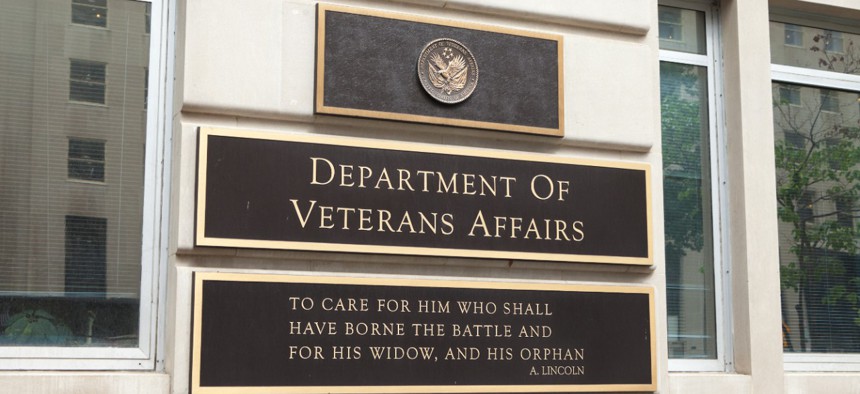
Mark Van Scyoc / Shutterstock.com
Court Deals Major Blow to Trump's Signature Civil Service Reform Law
Ruling will put "structure" and "safeguards" in place for employee discipline law, attorney says.
A Veterans Affairs Department doctor successfully won his job back on Tuesday after a federal appeals court ruled VA improperly applied provisions of a new accountability law President Trump has highlighted as a key civil service reform.
In Sayers v. VA, the U.S. Court of Appeals for the Federal Circuit ruled the department could not retroactively apply the 2017 VA Accountability and Whistleblower Protection Act, nor could it declare its punishments ineligible for review. The decision strikes major blows to VA’s authorities to enforce the law it, Trump and lawmakers on both sides of the aisle had trumpeted as a fundamental step to ease the disciplinary process for misbehaving and poorly performing employees. Employee groups and some lawmakers who originally supported the measure have criticized VA for abusing its authorities under the new law and disproportionately punishing low-ranking workers.
Jeffrey Sayers, a VA pharmacist for 37 years and until recently the chief of pharmacy in the Los Angeles area, brought his case to the appeals court after a Merit Systems Protection Board judge upheld VA’s decision to fire him. In his appeal, Sayers argued the firing was “arbitrary and capricious.” He went further, however, saying the provisions of the 2017 law used to expedite his removal violated his due process rights, failed to use the proper burden of proof and improperly circumvented the merit system principles afforded to all civil servants.
Sayers and his legal team did not win as broad of a ruling as they had initially hoped. Still, the retroactive ruling could lead to many more cases being overturned, according to Natalie Khawam, head off the Whistleblower Law Firm and one of Sayers’ attorneys. The appeals court noted MSPB is without its central board, which has created uncertainty for how to apply the law and an environment in which “different administrative judges have come to different non-binding interpretations of the statute.”
Sayers was fired for a failure to follow orders after he allegedly did not correct a faulty element of the patient record system he was using to fill prescriptions. VA found the alleged negligence harmed two veterans. Sayers was subsequently cited for alleged violations such as using expired equipment and not properly locking away pharmaceuticals. He has denied all the charges against him.
Regardless of the facts of the case, the appeals court said the alleged actions occurred prior to the Accountability Act’s passage and therefore VA “impermissibly applied” it retroactively. VA argued that failing to apply the law retroactively would give Sayers “a vested right to engage in poor performance and misconduct yet retain his job.” The court found that argument ignored that VA “always had the ability to remove Dr. Sayers for misconduct or poor performance,” even without the provisions of the new law.
In perhaps a bigger win for VA employees, the court disagreed with the department’s argument that only the facts underlying the case—and not the punishment itself—were reviewable. Reviewing an agency’s personnel decision, the court said, requires it to also review the choice of penalty.
The law requires MSPB “to review whether the secretary had substantial evidence for his decision that an employee’s actions warranted the adverse action,” the appeals court wrote. “The board cannot meaningfully review that decision if it blinds itself to the VA’s choice of action.”
It went on to say reviewing the punishment ensures the department cannot issue “absurd, unconstitutional” penalties.The court said its interpretation of the law would avoid a situation in which “an employee with an otherwise sterling record could be removed over a trivial incident.”
“Deciding that an employee stole a paper clip is not the same as deciding that the theft of a paper clip warranted the employee’s removal,” the court said.
Khawam said the Accountability Act “had no structure or safeguards” when VA first began using its new authorities, but the court’s ruling would help institute some. David Scher, Khawam’s co-counsel, said the court wanted to make clear VA’s argument—that its punishments, “no matter how disproportional, even if it was unconstitutional,” must stand so long as the facts of the case were correct—had no basis.
“The court was annoyed they were trying to assert so much power without judicial review,” Scher said. “Right now it is much clearer the VA can’t just arbitrarily fire people, they can’t rely on information occurring before statute was passed and they can’t just make up a remedy and expect it won’t get reviewed.”
The court punted on how it would handle a case in which it disagreed with VA’s assertion of fact, and it took no issue with the department using a lower evidentiary standard under the 2017 law. Still, the order has the potential for a far-reaching impact. It follows an arbitrator's decision that sided with the American Federation of Government Employees, finding VA violated its collective bargaining agreement with an edict that the Accountability Act enabled the department to fire employees without giving them the opportunity to improve performance. VA has appealed that decision, which could result in the department having to rehire previously fired employees. The appeals court decision also follows a previous effort to ease the firing of just Senior Executive Service employees at VA signed into law by President Obama that was eventually struck down in federal court, leading the department to stop using the authority.
VA could appeal the Sayers decision to the Supreme Court. A spokesperson said the department is “reviewing the decision and determining next steps.”







